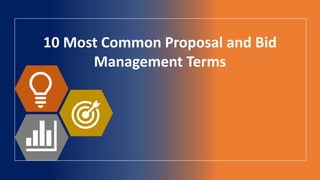
Proposal and Bid Management Terms.pptx
- 1. 10 Most Common Proposal and Bid Management Terms
- 2. 10 most common bid & proposal terms RFP (Request for Proposal) 1 RFQ (Request for Quote) 2 Scope of Work 3 Bid 4 Proposal 5 Compliance 6 Cost Estimation 7 Evaluation Criteria 8 Negotiation 9 Contract 10
- 3. 1. RFP (Request for Proposal) An RFP is a formal document that is issued by a company or organization when they are looking for a vendor or service provider to complete a specific project or solve a specific problem. The RFP will typically include a detailed description of the project, the scope of work, the requirements that the vendor must meet, and the timeline for completion. Vendors will then submit proposals in response to the RFP. An RFQ is a formal document that is issued by a company or organization when they are looking for a vendor or service provider to provide a specific product or service. The RFQ will typically include a detailed description of the product or service required, the quantity needed, and the timeline for delivery. Vendors will then submit quotes in response to the RFQ. 2. RFQ (Request for Quote)
- 4. 3. Scope of Work The scope of work is a detailed description of the tasks, deliverables, and timeline required for a specific project or service. It outlines the work that needs to be done, who will be responsible for completing it, and when it needs to be completed. A bid is a proposal submitted by a vendor or service provider in response to an RFP or RFQ. It outlines the vendor's approach to completing the project or providing the product or service, and includes a price quote. 4. Bid
- 5. 5.Proposal A proposal is a document submitted by a vendor or service provider that outlines the solution to a specific problem or need outlined in an RFP. It should be well-written and compelling, and demonstrate the vendor's qualifications and ability to complete the project or provide the product or service. Compliance is the act of ensuring that a proposal meets all the requirements outlined in an RFP, including formatting, content, and timeline. Compliance is important because failure to meet all the requirements can result in disqualification. 6. Compliance
- 6. 7. Cost Estimation Cost estimation is the process of calculating the costs associated with a project or service. It involves identifying all the expenses associated with completing the project, and then estimating the cost of each expense. Evaluation criteria are the criteria used by the client to evaluate and compare proposals submitted by vendors or service providers. These criteria will typically include things like price, quality, experience, and timeline. 8. Evaluation Criteria
- 7. 9. Negotiation Negotiation is the process of discussing and reaching an agreement on the terms of a proposal or bid. This may involve negotiating price, timeline, scope of work, or other factors. A contract is a legally binding agreement between a client and a vendor or service provider that outlines the terms and conditions of the project or service. The contract will typically include a description of the scope of work, the timeline, the price, and any other important details. It is important to have a well- written contract to ensure that all parties are clear on their responsibilities and obligations. 10. Contract
- 8. Proposal Management Process Course on Udemy https://www.udemy.com/course/an- overview-of-proposal-management- process/?referralCode=2B4B1B3CD4FF 76520327 Key Benefits of Completing this Course are: • Improved proposal development skills • Greater efficiency in proposal management • Enhanced collaboration and teamwork • Improved client relationships • Increased career opportunities
